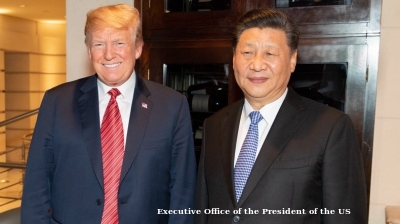Beijing’s top official for Taiwan affairs has restated its long-standing objective of unification, describing it as “the best path forward” for the island, even as Taipei rejects the overture and warns of covert annexation, Reuters reports.
At an event in the Chinese capital to mark the 80th anniversary of the island’s claimed “restoration”, Wang Huning, a member of the Chinese Communist Party Politburo Standing Committee and the party’s lead on Taiwan affairs, said that achieving unification with Taiwan via peaceful means remained the preferred route – a term phrased as reunification in Beijing political circles despite what is modern China never having ruled over Taiwan or any Taiwanese territory. “Peaceful reunification” is the best outcome he was reported as saying by Reuters.
In response, however, Taiwan's Mainland Affairs Council (MAC) said China was simply trotting out the "same old message" and that in a similar manner to what happened in Hong Kong, China's eventual goal is to "annex" Taiwan the news agency added. "The experience of Hong Kong has also demonstrated that 'one country, two systems' ultimately amounts to authoritarian rule by the Chinese Communist Party," MAC was quoted as saying.
Wang added that the mainland intended to take the lead in sharing the benefits of its development with Taiwan’s people – a nation already seen as far wealthier and substantially more developed than the bulk of China.
On the island itself, the government refrained from participating in Beijing’s event, instead marking the 1949 Battle of Guningtou anniversary, when Taiwanese forces repelled a communist invasion attempt on the outlying island of Kinmen.
President (William) Lai Ching‑te wrote on his social-media page over the weekend that “We hope to further become a trusted security partner to our allies, and together build a strong line of defence to safeguard the values of freedom and democracy.” The Economic Times added.
Meanwhile in overnight October 25 – 26 developments as US President Trump arrived in Kuala Lumpur, the US has rejected claims it is now negotiating with China over Taiwan. Marco Rubio, the US Secretary of State, told reporters that the administration of Donald Trump is not contemplating any agreement that would compromise Taiwan’s status, Vedomosti reported late on October 25.
“If anyone is worried that we might make a trade deal in which we are offered great terms in exchange for giving up Taiwan — nobody is even thinking about it,” Rubio is reported as saying. His statement has already set off alarm bells in Taiwan.
Few on the island spoken to by a resident Bne Intellinews editor in recent years – political figures included - truly believe the US will readily help Taiwan should Chinese forces en-masse cross the Taiwan Strait on the orders of Xi Jinping. Instead, claims that Taiwan simply needs to use the US for as long as possible to purchase weapons for self-defence is seen as the long-term ideal.
Many Taiwanese see President Trump’s flip-flopping on whether or not he supports Ukraine on any given day is indicative of how he would treat any potential backing for Taipei following a Chinese invasion; always looking at the personal gain angle, for both the US and himself.
The statement from Rubio comes amid speculation that China’s President Xi Jinping is seeking to leverage the US president’s interest in improving economic relations as a means of altering Washington’s longstanding position on Taiwan, when they speak later in the week.
US media and some in Asia are, however, leaning towards Rubio’s remarks serving to reassure allies and observers in the Asia-Pacific region that while Washington may pursue stronger economic ties with Beijing, its commitment to Taiwan’s security and autonomy remains non-negotiable.
The broader backdrop though is one of much needed recalibration for the US and China. In recent months, Washington has signalled a willingness to engage more intensively with Beijing on economic issues, even as it simultaneously reinforces defence partnerships across the region.
Rubio’s refutation also reflects internal US political sensitivities. Support for Taiwan maintaining its independence enjoys strong bipartisan backing in the US Congress at present, and any suggestion that the administration might quietly downgrade its posture risks provoking a backlash.
The Secretary of State’s emphatic phrasing “nobody is even thinking about it” is therefore said to underscore just how resolute the message is intended to be. But whether or not it proves accurate in the long run is now being seriously reconsidered by some in Taiwan.
Features

Asian economies weigh their options amid fears of over-reliance on Chinese rare-earths
Just how control over these critical minerals plays out will be a long fought battle lasting decades, and one that will increasingly define Asia’s industrial future.

BEYOND THE BOSPORUS: Espionage claims thrown at Imamoglu mean relief at dismissal of CHP court case is short-lived
Wife of Erdogan opponent mocks regime, saying it is also alleged that her husband “set Rome on fire”. Demands investigation.

Turkmenistan’s TAPI gas pipeline takes off
Turkmenistan's 1,800km TAPI gas pipeline breaks ground after 30 years with first 14km completed into Afghanistan, aiming to deliver 33bcm annually to Pakistan and India by 2027 despite geopolitical hurdles.

Looking back: Prabowo’s first year of populism, growth, and the pursuit of sovereignty
His administration, which began with a promise of pragmatic reform and continuity, has in recent months leaned heavily on populist and interventionist economic policies.



